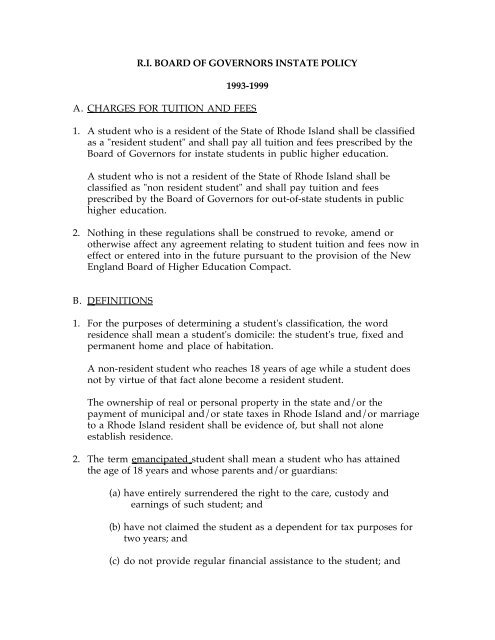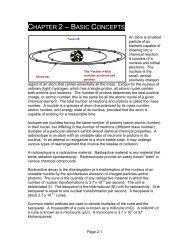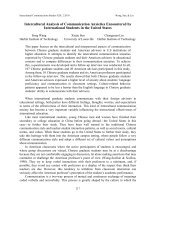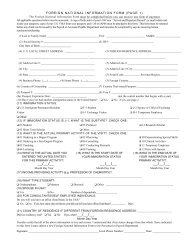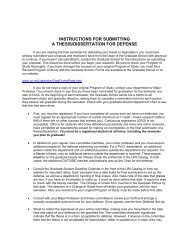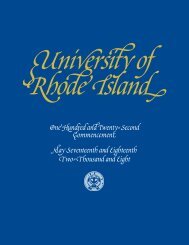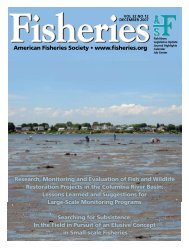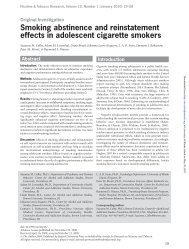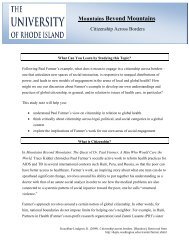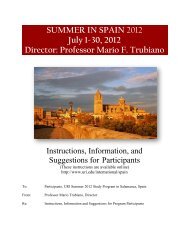Board of Governor's In-State Policy - University of Rhode Island
Board of Governor's In-State Policy - University of Rhode Island
Board of Governor's In-State Policy - University of Rhode Island
You also want an ePaper? Increase the reach of your titles
YUMPU automatically turns print PDFs into web optimized ePapers that Google loves.
R.I. BOARD OF GOVERNORS INSTATE POLICY<br />
1993-1999<br />
A. CHARGES FOR TUITION AND FEES<br />
1. A student who is a resident <strong>of</strong> the <strong>State</strong> <strong>of</strong> <strong>Rhode</strong> <strong>Island</strong> shall be classified<br />
as a "resident student" and shall pay all tuition and fees prescribed by the<br />
<strong>Board</strong> <strong>of</strong> Governors for instate students in public higher education.<br />
A student who is not a resident <strong>of</strong> the <strong>State</strong> <strong>of</strong> <strong>Rhode</strong> <strong>Island</strong> shall be<br />
classified as "non resident student" and shall pay tuition and fees<br />
prescribed by the <strong>Board</strong> <strong>of</strong> Governors for out-<strong>of</strong>-state students in public<br />
higher education.<br />
2. Nothing in these regulations shall be construed to revoke, amend or<br />
otherwise affect any agreement relating to student tuition and fees now in<br />
effect or entered into in the future pursuant to the provision <strong>of</strong> the New<br />
England <strong>Board</strong> <strong>of</strong> Higher Education Compact.<br />
B. DEFINITIONS<br />
1. For the purposes <strong>of</strong> determining a student's classification, the word<br />
residence shall mean a student's domicile: the student's true, fixed and<br />
permanent home and place <strong>of</strong> habitation.<br />
A non-resident student who reaches 18 years <strong>of</strong> age while a student does<br />
not by virtue <strong>of</strong> that fact alone become a resident student.<br />
The ownership <strong>of</strong> real or personal property in the state and/or the<br />
payment <strong>of</strong> municipal and/or state taxes in <strong>Rhode</strong> <strong>Island</strong> and/or marriage<br />
to a <strong>Rhode</strong> <strong>Island</strong> resident shall be evidence <strong>of</strong>, but shall not alone<br />
establish residence.<br />
2. The term emancipated student shall mean a student who has attained<br />
the age <strong>of</strong> 18 years and whose parents and/or guardians:<br />
(a) have entirely surrendered the right to the care, custody and<br />
earnings <strong>of</strong> such student; and<br />
(b) have not claimed the student as a dependent for tax purposes for<br />
two years; and<br />
(c) do not provide regular financial assistance to the student; and
(d) whose income was not taken into account by any private or<br />
governmental agency furnishing financial education assistance to<br />
the student, including scholarships, Loans, or otherwise.<br />
If any <strong>of</strong> the aforesaid tests are not met, the student shall be presumed to be<br />
unemancipated.<br />
C . CRITERIA<br />
1. Unemancipated Students<br />
(a) Any unemancipated student whose parents or guardians have been<br />
residents <strong>of</strong> the state for one year immediately preceding the first class day<br />
<strong>of</strong> the first semester <strong>of</strong> the student's registration in a public college or<br />
university shall be classified as a resident student as Long as the parents<br />
or guardians continue to be residents <strong>of</strong> the state.<br />
(b) Any unemancipated student who initially was classified as a non-resident<br />
student may thereafter obtain re-classification only if the student's<br />
parents or guardians establish and maintain residence in <strong>Rhode</strong> <strong>Island</strong><br />
for a period <strong>of</strong> at least one year prior to the first class day <strong>of</strong> the semester<br />
for which the student seeks to be re-classified as a resident student.<br />
(c) The residence <strong>of</strong> an unemancipated student, including those whose<br />
parents are divorced or legally separated, shall follow that <strong>of</strong> the parent<br />
who has legal custody and/or the parent who is responsible for the<br />
financial support <strong>of</strong> the student, whichever favors the student's request<br />
for resident student status.<br />
An unemancipated student under guardianship shall be required to<br />
present satisfactory documentary evidence <strong>of</strong> the appointment <strong>of</strong> the<br />
guardian in addition to a certification <strong>of</strong> the residence <strong>of</strong> the guardian,<br />
which shall be considered the residence <strong>of</strong> the student unless there are<br />
circumstances indicating that such guardianship was created primarily for<br />
the purpose <strong>of</strong> conferring the status <strong>of</strong> resident student status on the<br />
student.<br />
(d) An unemancipated student whose parent is a member <strong>of</strong> the Armed<br />
Forces and stationed in the state pursuant to military orders shall be<br />
entitled to the classification as a resident student during any semester the<br />
first class day <strong>of</strong> which is encompassed by the orders. A member <strong>of</strong> the<br />
Armed Forces or his or her spouse stationed in the state on military orders<br />
shall be entitled to classification as a resident student.<br />
2. Emancipated Students
(a) Any emancipated student may be classified as a resident student if he or<br />
she meets the following tests:<br />
1) At the time <strong>of</strong> emancipation, the student's parents or guardians were<br />
residents <strong>of</strong> <strong>Rhode</strong> <strong>Island</strong> for one year immediately preceding the first<br />
class day <strong>of</strong> the first semester <strong>of</strong> the student's registration at a public<br />
college or university.<br />
-or-<br />
Having become emancipated, the student establishes and maintains<br />
residence in <strong>Rhode</strong> <strong>Island</strong> for one year immediately preceding the<br />
first day <strong>of</strong> the first semester <strong>of</strong> his or her registration at a public<br />
college or university: and<br />
2) The student does not hold residence in another state or foreign<br />
country: and<br />
3) The student is and continues to be a resident <strong>of</strong> <strong>Rhode</strong> <strong>Island</strong>.<br />
(b) Any emancipated student who initially was classified as a non-resident<br />
student may thereafter obtain re-classification as a resident student only if the<br />
student establishes and maintains residence in <strong>Rhode</strong> <strong>Island</strong> for a period <strong>of</strong> at<br />
least one year prior to the first class day <strong>of</strong> the semester for which he or she<br />
seeks to be reclassified as a resident student.<br />
A student from another state or foreign country who is enrolled at a public<br />
college or university for more than six credits per semester shall be presumed<br />
to be in <strong>Rhode</strong> <strong>Island</strong> primarily for educational purposes and will be<br />
presumed to have not been a resident <strong>of</strong> the state during the time so enrolled.<br />
Continued presence in <strong>Rhode</strong> <strong>Island</strong> during vacation periods or occasional<br />
interruptions in the course <strong>of</strong> study will not, <strong>of</strong> itself, overcome these<br />
presumptions.<br />
D. PROCEDURES FOR INSTITUTIONS<br />
1. The Residency Officer shall classify each person accepted by a public college<br />
or university as a resident or non-resident student. Said classification shall<br />
be based upon all relevant information made available to the Residency<br />
Officer, including, but not limited to, information submitted by or on<br />
behalf <strong>of</strong> the student. The Residency Officer may, as a condition <strong>of</strong><br />
registration, require such written documents and other relevant evidence<br />
as is deemed necessary or helpful to determine the residence <strong>of</strong> the<br />
applicant.
2. Any student who has been classified as a non-resident student and who<br />
claims that his or her status has changed during attendance at the<br />
institution may request the Residency Officer for a re-classification,<br />
submitting relevant evidence in support <strong>of</strong> this claim.<br />
Based upon relevant evidence, the institution may request the Residency<br />
Officer to re-classify a student, if the student's status has changed during<br />
attendance at the institution.<br />
If the Residency Officer determines that the student has become a resident,<br />
the student shall be classified as a resident student effective with the<br />
beginning <strong>of</strong> the semester next following the determination. Decisions on<br />
classification will be communicated to the student in written form.<br />
Requests for a change <strong>of</strong> classification will not be considered more than<br />
once in any semester.<br />
3. Any student who is classified as a non-resident student by the Residency<br />
Office may, by filing a written request with the Residency Officer within<br />
thirty days <strong>of</strong> receipt <strong>of</strong> notification <strong>of</strong> the classification, appeal the<br />
Residency Officer's decision to the <strong>Board</strong> <strong>of</strong> Residency Review. The<br />
Residency <strong>of</strong>ficer shall thereupon transmit the record, including a<br />
statement <strong>of</strong> the reasons for the decision to the <strong>Board</strong> <strong>of</strong> Residency<br />
Review, and the board shall decide the appeal upon the record together<br />
with such additional written information as the student may furnish or<br />
the board may require. The <strong>Board</strong> <strong>of</strong> Residency Review shall hold an<br />
informal hearing. The decision <strong>of</strong> the <strong>Board</strong> <strong>of</strong> Residency Review shall be<br />
final.<br />
E. PENALTIES<br />
Misrepresentation <strong>of</strong> facts in order to qualify for resident student classification<br />
shall be considered cause for suspension or permanent exclusion from a<br />
public college or university. Moreover, it may subject the student to criminal<br />
prosecution.


